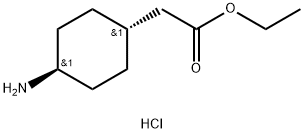CarbaMic acid, N-[trans-4-(2-hydroxyethyl)cyclohexyl]-, 1,1-diMethylethyl ester
- CAS NO.:917342-29-1
- Empirical Formula: C13H25NO3
- Molecular Weight: 243.34
- MDL number: MFCD03844626
- SAFETY DATA SHEET (SDS)
- Update Date: 2025-02-23 21:28:46
![CarbaMic acid, N-[trans-4-(2-hydroxyethyl)cyclohexyl]-, 1,1-diMethylethyl ester Structural](https://img.chemicalbook.in/CAS/GIF/917342-29-1.gif)
What is CarbaMic acid, N-[trans-4-(2-hydroxyethyl)cyclohexyl]-, 1,1-diMethylethyl ester?
The Uses of CarbaMic acid, N-[trans-4-(2-hydroxyethyl)cyclohexyl]-, 1,1-diMethylethyl ester
trans-1-(Boc-amino)-4-(2-hydroxyethyl)cyclohexane can be used for preparing quinolinones and analogs for treating multi-drug resistant bacterial infections. It can also be used for preparing the antipsychotic drug Cariprazine.
What are the applications of Application
(trans-4-Hydroxymethylcyclohexyl)carbamic Acid tert-Butyl Ester is used to prepare C-2 hydroxyethyl imidazopyrrolo pyridines as JAK1 inhibitors. It is also used to prepare Mer kinase inhibitors for treatment of pediatric acute lymphoblastic leukemia.
Synthesis

An 500 ml four-necked flask is charged with 40 g (0,18 mol) of trans 2-[1-(4-amino]- cyclohexyl)-acetic acid ethyl ester hydrochloride and 160 ml of dichloromethane. To the resulting suspension 18,2 g (0,18 mol) of triethylamine is added. The reaction mixture is cooled to a temperature between 8-10°C and a solution of 40,0 g (0,185 mol) of di(tert-butyl)dicarbonate in 100 ml of dichloromethane is added for 1 hour with stirring under nitrogen. Then the reaction mixture is allowed to warm to a temperature between 22-25°C and stirred until the reaction proceeds. After completion of the reaction 100 g of 5% aqueous sodium carbonate is added and the phases are separated. The organic layer is extracted with 50 ml of water and after separation the organic layer is dried under Na2SO4 and the filtrate is concentrated in vacuum. The trans 2-{1-[4-(N-tert-butoxycarbonyl)-amino]-cyclohexyl}-acetic acid ethyl ester obtained is dissolved in 460 ml of tetrahydrofurane then 13,68 g (0,36 mol) of sodium borohydride is added at 25°C under nitrogen. With stirring, to the reaction mixture a solution of 24,0 g (0,18 mol) of aluminium chloride in 250 ml abs. tetrahydrofurane is added dropwise at a temperature between 18-22°C for 1 hour under nitrogen then the mixture is stirred for additional 2 hours. After completion of the reaction the mixture is cooled to a temperature between 5-10°C and 650 ml of water and 600 ml of toluene are added. Then the pH was adjusted to 3-4 by adding 40-45 ml of concentrated hydrochloric acid and the stirring was continued at a temperature between 20-25°C for 1 hour. The phases are separated, the aqueous layer is extracted with 50 ml of toluene and the combined organic layers are washed with 3×150 ml of water and dried in vacuum. In this manner 41,1 g of title compound was obtained. Yield: 94% 20. Melting point: 101-103°C.
Properties of CarbaMic acid, N-[trans-4-(2-hydroxyethyl)cyclohexyl]-, 1,1-diMethylethyl ester
| Boiling point: | 366.0±11.0 °C(Predicted) |
| Density | 1.03±0.1 g/cm3(Predicted) |
| storage temp. | Sealed in dry,Room Temperature |
| pka | 12.56±0.40(Predicted) |
Safety information for CarbaMic acid, N-[trans-4-(2-hydroxyethyl)cyclohexyl]-, 1,1-diMethylethyl ester
Computed Descriptors for CarbaMic acid, N-[trans-4-(2-hydroxyethyl)cyclohexyl]-, 1,1-diMethylethyl ester
New Products
Methyl (R)-1-Boc-4,4-difluoropyrrolidine-2-carboxylate 2,2-Difluoropropylamine hydrochloride tert-butyl 3-bromoazetidine-1-carboxylate (R)-1-Boc-3-hydroxypyrrolidine DIFLUOROACETIC ANHYDRIDE 2,2-Difluoropropionic acid Diallylamine, 99% Calcium hydroxide, 95% Aluminum oxide, basic 2-Bromophenylacetonitrile, 97% L-tert-Leucine,97% N-Hydroxy-2-methylpropanimidamide 4-(3,4-Dichlorophenyl)-3,4-Dihydro-N-Methyl-1-(2H)-Naphthalenimine (Schiff Base) 2-AMINO-3,5-DIBROMO BENZALDEHYDE [ADBA] L-Glutamic Acid Dimethyl Ester Hcl 10-Methoxy-5H-dibenz[b,f]azepine 5-Cyanophthalide N, N-Carbonyldiimidazole (CDI) Dibenzoyl Peroxide Titanium Dioxide 2-(Methylthio) Benzonitrile Sodium Acetate Anhydrous Allopurinol 1,5-DibromopentaneRelated products of tetrahydrofuran
![Ethyl trans-2-[4-(Boc-aMino)cyclohexyl]acetate](https://img.chemicalbook.in/CAS/GIF/946598-34-1.gif)


You may like
-
 917342-29-1 Trans-1-(boc-amino)-4-(2-hydroxyethyl) cyclohexane 98%View Details
917342-29-1 Trans-1-(boc-amino)-4-(2-hydroxyethyl) cyclohexane 98%View Details
917342-29-1 -
 tert-Butyl trans-4-(2-hydroxyethyl)cyclohexylcarbamate 95% CAS 917342-29-1View Details
tert-Butyl trans-4-(2-hydroxyethyl)cyclohexylcarbamate 95% CAS 917342-29-1View Details
917342-29-1 -
![Cis-2-(Bromomethyl)-2-(2,4-Dichlorophenyl)-1,3-Dioxolane-4-Ylmethyl Benzoate [CBB] 61397-56-6 99%](https://img.chemicalbook.in//Content/image/CP5.jpg) Cis-2-(Bromomethyl)-2-(2,4-Dichlorophenyl)-1,3-Dioxolane-4-Ylmethyl Benzoate [CBB] 61397-56-6 99%View Details
Cis-2-(Bromomethyl)-2-(2,4-Dichlorophenyl)-1,3-Dioxolane-4-Ylmethyl Benzoate [CBB] 61397-56-6 99%View Details
61397-56-6 -
 Ethyl-2-Chloroacetoacetate 609-15-4View Details
Ethyl-2-Chloroacetoacetate 609-15-4View Details
609-15-4 -
 CIS- BROMO BENZOATEView Details
CIS- BROMO BENZOATEView Details
61397-56-6 -
 609-15-4View Details
609-15-4View Details
609-15-4 -
![1-(6-Methylpyridin-3-Yl)-2-[4-(Methylsulfonyl)Phenyl]Ethanone [Ketosulfone] 99%](https://img.chemicalbook.in//Content/image/CP5.jpg) 1-(6-Methylpyridin-3-Yl)-2-[4-(Methylsulfonyl)Phenyl]Ethanone [Ketosulfone] 99%View Details
1-(6-Methylpyridin-3-Yl)-2-[4-(Methylsulfonyl)Phenyl]Ethanone [Ketosulfone] 99%View Details
221615-75-4 -
 27143-07-3View Details
27143-07-3View Details
27143-07-3
